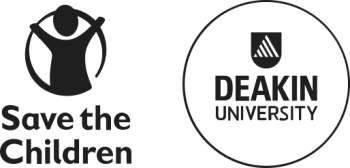Stephen and Phil discussed the development of a humanitarian accreditation, and the ideas generated in their early conversation grew to form what was the earliest iteration of the Centre for Humanitarian Leadership – the Humanitarian Leadership Program, or HLP.
The HLP was created to provide students with the best of both Save the Children and Deakin University: blending practical humanitarian experiences gleaned from a network of practicing aid professionals with leading academic research and teaching methodologies.
And so, with seed funding from the Australian Aid Program, and ongoing contributions of expertise, endeavour, and personnel from partners like World Vision and Oxfam, the Humanitarian Leadership Program was brought to life.
Going global
After a period of proven success in upskilling leaders in the Australasian region, the HLP team submitted a proposal to the IKEA Foundation to help the HLP evolve, grow, and serve the needs of a global humanitarian system. The IKEA Foundation’s grant took the HLP to the rest of the world and paved the way for the creation of the Centre for Humanitarian Leadership.

The development of the HLP provided a blueprint for the new Centre for Humanitarian Leadership, and the close partnership between Deakin University and Save the Children provided a unique framework for learning that blends humanitarian experience with academic rigour.
In 2018, the French-language Diplôme d Études Supérieures en Leadership Humanitaire joined the Masters of Humanitarian Assistance and Graduate Certificate in Humanitarian Health (since discontinued) as Deakin University accredited courses, and has since grown exponentially, now educating hundreds of Francophone humanitarian leaders across the world every year.
In safe hands
Associate Professor Mary Ana McGlasson joined the CHL in June 2020 following a major restructure to better accommodate the growing services and team. She came to the Centre with almost 20 years of experience as a Family Nurse Practitioner and a decade of country level experience designing, implementing and overseeing humanitarian and development programs in a wide range of contexts in Africa, Asia-Pacific and the Middle East, in roles including Country Director, Global Emergency Response Coordinator and Global Health Advisor. Alongside a core team of staff and associates experienced in humanitarian response, leadership, development, coaching and learning design, recent years have seen the CHL grow and thrive in challenging circumstances, even as COVID-19 buffeted the university and aid sectors.
The Centre now partners with more than three dozen organisations around the world, and conducts a wealth of academic research and policy insight projects, all rooted in both academic vigour and humanitarian practice. We straddle the worlds of practice and research, piloting collaborative research to inform, impact, and influence real world leadership in disasters and conflicts, and enabling informed and sustainable change.
Innovation in an ever-changing world
Today, the CHL has expanded its original remit far beyond the original vision. Now, in addition to providing accredited university courses, we are working to reach first responders wherever they are, by providing bespoke leadership development and training programs suited to their needs, skills and capacities. These short courses incorporate professional coaching and mentoring, and offer hands-on education activities with flexible delivery models in a range of languages to meet the needs of anyone working in crisis response interested in becoming a better and more effective humanitarian leader.
The result is a rich community of people dedicated to teaching, understanding, analysing, demonstrating, interrogating, and constantly refining what it means to be an effective humanitarian leader.
Together, we make up the CHL family.
